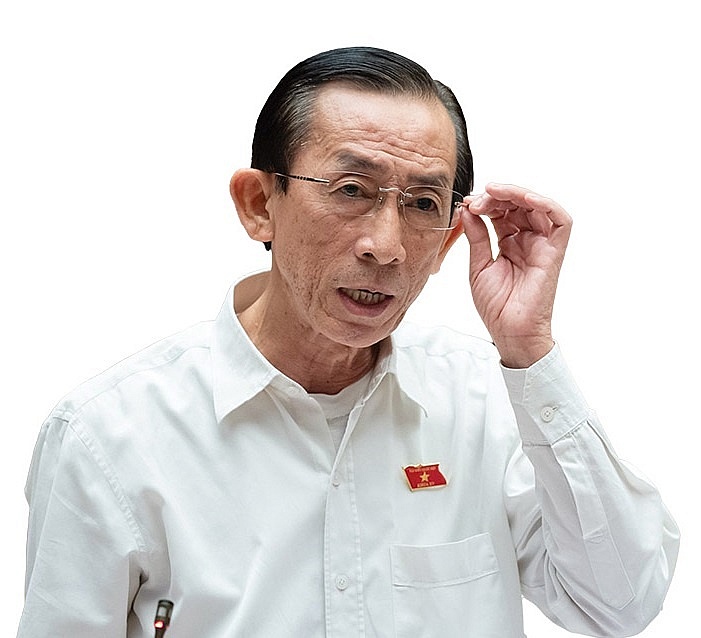Business complexities must be eased
The National Assembly (NA) last week saw intense discussions as lawmakers voiced concerns over the weak competitiveness of the economy, citing ongoing challenges facing enterprises due to both domestic and international pressures. They called on the government to introduce more targeted solutions, noting that economic growth remains fragile.
 |
| Enterprises are facing a host of economic challenges |
The economy grew 6.82 per cent on-year in the first nine months of the year, partly due to the low on-year growth of only 4.24 per cent recorded in the same period last year. This means the 6.82 per cent growth rate, while notable, is still not as high as initially anticipated.
NA deputy Tran Thi Quynh, representing the northern province of Nam Dinh, cautioned that despite signs of economic recovery, significant issues remain.
“A close examination shows that economic demand is still weak. Total revenue from retail and consumption services over the nine months grew 7.6 per cent on-year,” Quynh said. “Excluding inflation, this rate falls below 5 per cent on-year, considerably lower than the overall economic growth. This suggests that the recovery has largely been driven by exports, meaning external demand.”
“Meanwhile, public investment continues at a slow pace, achieving less than half of the annual plan in the first nine months,” she said. “The nine-month state budget surplus, amounting to an $8 billion surplus, also indicates weak public disbursement. Clearly, the economy’s health remains fragile and in need of more supportive policies. Current fiscal policies lag behind the economy’s actual needs.”
Other NA deputies called for clearer support for businesses, the backbone of the economy. They suggested extending fiscal support through VAT reductions until at least mid-next year and providing further assistance for households and enterprises affected by natural disasters.
Lawmakers also highlighted the lack of adjustments to taxable income despite rising inflation over the past four years, recommending an increase in the taxable income threshold to boost disposable income and stimulate spending.
According to NA deputy Pham Hung Thang representing the northern province of Ha Nam, businesses are experiencing immense woes.
“The number of businesses exiting the market remains high,” Thang said. “The government should continue reviewing, amending, and updating policies to help businesses, particularly regarding cumbersome administrative procedures and high lending rates.”
NA deputy La Thanh Tan representing the northern port city of Haiphong highlighted the urgent need to remove excessive business conditions.
“By law, individuals are allowed to engage in business activities not prohibited by law. However, in practice, enterprises face numerous hurdles, including excessive licensing requirements imposed by local authorities,” Tan said. “This has delayed business plans, wasting time and resources, and stifling business and investment opportunities. This explains the slow growth in both the quantity and quality of businesses.”
During the 15th NA’s ongoing eighth session, the National Assembly Standing Committee agreed to remove the requirement for fire prevention business to be classified as a conditional sector under the draft law on fire prevention and fighting. Now, companies can self-approve fire prevention plans, with agencies only conducting inspections when incidents arise.
“This is a step forward in legislative reform that benefits businesses. It maintains state oversight while freeing up resources for development,” Tan said. “Without removing more restrictive conditions, more businesses will continue to leave the market.”
Figures from the General Statistics Office indicate that in the first 10 months of this year, nearly 136,100 new enterprises were established with a total registered capital as much as of $54.67 billion.
However, during this period, more than 92,100 businesses temporarily halted operations, a 13.6 per cent increase compared to the same period last year. Additionally, over 63,700 enterprises suspended operations while awaiting dissolution procedures (a 25.6 per cent rise on-year), and nearly 17,400 firms completed dissolution procedures, marking an on-year increase of nearly 20.5 per cent. On average, about 17,300 businesses exited the market each month.
Lawmakers also suggested that the State Bank of Vietnam introduce specific credit packages to support sectors in need of development, such as agriculture, aquaculture, tourism, processing, and exports. They also called for swift implementation of credit packages to support social housing.
“It’s essential to inject more capital into the economy, boost commercial banks’ lending capacity, stabilise the USD, and limit dollar hoarding while improving banks’ lending capacity,” said Quynh from Nam Dinh.
The government expects GDP growth to reach 7 per cent this year and has proposed a target of 6.5-7 per cent growth for next year, with an aspiration to achieve 7.0-7.5 per cent growth given better conditions. This would help position Vietnam’s economy near the top 30 globally by late 2025 in terms of GDP.
Standard Chartered recently revised its forecast for Vietnam’s 2024 GDP growth to 6.8 per cent (up from 6 per cent), with momentum expected to slow from Q3. The bank anticipates Q4 growth to moderate to 6.9 per cent. Retail sales growth is likely to ease to 6.2 per cent (from 7.6 per cent), with export sector growth slowing to 6.2 per cent (from 10.7 per cent), though electronics exports may see year-to-date improvement.
Imports and industrial production likely grew at around 4 per cent and 9.2 per cent, respectively. Credit growth has remained around 9 per cent in the year-to-date, as of the end of September.
Tim Leelahaphan, economist for Thailand and Vietnam at Standard Chartered Bank, said, “While we remain cautious on Vietnam’s economy near-term given the recent moderation in macro data, we also acknowledge the economy’s ability to perform better than market expectations. The government’s push for stronger economic growth may support low interest rates in the near future.”
| Tran Hoang Ngan, NA deputy, Ho Chi Minh City
I would like to emphasise three key growth drivers. First is exports. In the first nine months of 2024, export turnover grew 15.4 per cent, yet only about 28 per cent of exporters were Vietnamese. It’s crucial to have policies connecting foreign companies with domestic firms, with strategies to develop mechanical engineering, supporting industries, and materials. We must also focus on products with Vietnamese brands, including agricultural and aquaculture products. Vietnam’s digital technology and IT products have gained international traction, with 1,500 digital enterprises going abroad. On-site exports and tourism development should also receive more attention. Second is investment, which has continued to rise. However, while funding from abroad has increased, domestic investment has been slow. Policies to support local businesses, especially smaller ones, are vital. New laws can help remove institutional barriers. Although domestic consumption is recovering, it remains below pre-pandemic growth. Policies supporting consumption, especially through tax reductions and incentives to prioritise Vietnamese goods, are necessary. Pensions, social insurance, and allowances for those with meritorious services should also be adjusted. Nguyen Van Thi, NA deputy, Bac Giang province
While public investment disbursement has improved, it hasn’t met the targets. The national disbursement rate in the first nine months was 47.29 per cent, lower than last year. Many businesses still face significant challenges, with numerous enterprises exiting the market. Credit growth remains low despite interest rate cuts, and the rising price of gold reflects public uncertainty, leading to gold hoarding for safekeeping. It is crucial that the government thoroughly analyse the underlying issues and implement specific, effective measures to accelerate public investment disbursement and support business development. |
 | Vietnam’s fiscal policy can perform a stronger role High interest rates elsewhere have led to consumption and export issues. Suan Teck Kin, head of Research at UOB, shared with VIR’s Nhue Man his prospects on Vietnam’s development and its monetary policies to face to the impact of activity involving China and the United States. |
 | Fiscal rigidity a challenge for nation’s economic aspirations High-profile international organisations are recommending that the Vietnamese government creates stronger solutions to fuel aggregate demand. |
What the stars mean:
★ Poor ★ ★ Promising ★★★ Good ★★★★ Very good ★★★★★ Exceptional
Related Contents
Latest News
More News
- State corporations poised to drive 2026 growth (February 03, 2026 | 13:58)
- Why high-tech talent will define Vietnam’s growth (February 02, 2026 | 10:47)
- FMCG resilience amid varying storms (February 02, 2026 | 10:00)
- Customs reforms strengthen business confidence, support trade growth (February 01, 2026 | 08:20)
- Vietnam and US to launch sixth trade negotiation round (January 30, 2026 | 15:19)
- Digital publishing emerges as key growth driver in Vietnam (January 30, 2026 | 10:59)
- EVN signs key contract for Tri An hydropower expansion (January 30, 2026 | 10:57)
- Vietnam to lead trade growth in ASEAN (January 29, 2026 | 15:08)
- Carlsberg Vietnam delivers Lunar New Year support in central region (January 28, 2026 | 17:19)
- TikTok penalised $35,000 in Vietnam for consumer protection violations (January 28, 2026 | 17:15)



 Tag:
Tag:


















 Mobile Version
Mobile Version